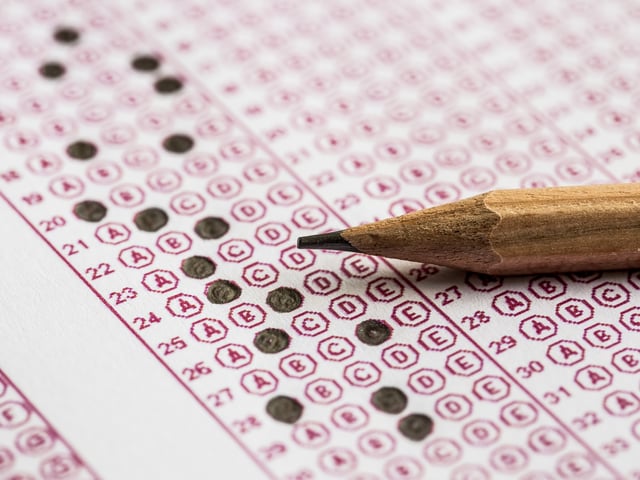
What is the Highest ACT Score a Student Can Earn?
Are you a high school student hoping to gain admission into the college of your dreams?
If so, you will want the highest ACT score possible!
ACT scores are used for college admission decisions and awarding academic-based scholarships. While not all schools require ACT scores, you can still submit your test scores for consideration.
To give yourself the best chance of admission, you will have to achieve your school’s average ACT score or higher.
Find out what is the highest ACT score and how you can achieve it with Union Test Prep.
What Is the ACT?
The ACT is an entrance exam that helps U.S. colleges and universities make admissions decisions.
The ACT is slightly different from the SAT as it also includes a science section. However, both tests are weighted equally by colleges and universities.
The purpose of the ACT is to gauge a student’s college readiness. The ACT is designed to test for academic achievement in four areas of learning: English, Reading, Mathematics, and Science. The material in the test includes information you have already learned in school.
The ACT also has an optional Writing test. Students should check their prospective school of choice to determine whether it is required. Students planning to take the Writing test should do it at the same time as the other tests.
When to Take the ACT
Many high schools recommend taking the ACT twice: once in the spring and again in the fall of senior year. The latter is only required if you want to improve your score.
The spring of your junior year is recommended because some of the content in the Mathematics section of the test is not covered before then.
You can take the test 12 times. This includes tests that were canceled by you or the ACT testing service.
The test is multiple-choice (minus the Writing section) and takes 2 hours and 55 minutes. If you choose to complete the optional Writing section, it will add 40 minutes to your exam time.
The Writing section is an essay test that measures your writing skills taught during high school classes. While all schools don’t require it, some do or at least recommend students take it.
As of 2024, the costs for the ACT are:
-
The whole ACT (no writing) is $68
-
The whole ACT with writing is $93
The fee for the ACT includes reports for you, your high school, and up to four colleges.
You will get one 10-minute break after the Mathematics section (second test) and another 10-minute break before the Writing section (if applicable to you). Take this break as an opportunity to stretch your legs, grab a quick snack, use the bathroom, and have a drink of water.
How Are ACT Scores Calculated?
When you complete the ACT, you will receive a raw score. Your ACT raw score is equivalent to the number of questions you got right on the test. You earn one point for each correct answer.
For example, if you got 50 questions correct in the English section, your raw score would be 50.
After that, your raw scores are converted to scaled scores. Scale scores are numbered between 1 to 36. The four scaled scores are averaged and rounded to the nearest whole number. This number is your final ACT score.
What Is the Highest ACT Score?
The highest ACT score is 36. It’s important to know that a score of 36 is an average of the four section scores.
You don’t have to get every question correct to get the highest ACT score.
For example, you can get a question wrong in the English or Mathematics section and still receive a 36 in those sections. However, you will need to get every question right in the Reading and Science sections. There are fewer questions in total (40 to be exact), and they are weighted more heavily.
Keep in mind that this is just one example of how the scores are calculated. To avoid confusion or disappointment, your goal should be to answer every question right to get the perfect ACT score.
In 2019, 17 Walnut Hills High School students achieved a perfect ACT score of 36, in addition to the 23 students who earned a score of 35.
As you can see, getting a high score on the ACT isn’t impossible. You could get into your dream school with enough preparation as these budding students did.
ACT Scoring: The Good, the Bad, and the Average ACT Score
The average ACT score is 21. If you score 21 on your ACT, you have scored higher than 50% of test-takers. Depending on your goals, this is a solid score.
Keep in mind that most colleges have varying average scores. Check in with your school of choice to find out what is the lowest score they will accept.
Generally speaking, many colleges and universities will accept ACT scores no lower than 16 or 17. Note that scores between 1–19 are considered poor or below average.
To achieve an above-average or competitive score, aim for 26 to 29. For the highest or best score, try for 30 to 35. Of course, receiving a 36 on your ACT is the perfect and maximum score you can achieve.
Tips for Getting a Perfect ACT Score
Do you have what it takes to get the perfect ACT score?
The students who receive a score of 36 don’t leave study prep to the last minute. They’re prepared, well-rested, and confident in their test-taking abilities.
Does this sound like you? Here are seven top tips to get a perfect score on the ACT.
1. Practice Your Speed and Accuracy
Most standardized tests are timed, and the ACT is no exception. With 2 hours and 55 minutes to complete the test, you must have the ability to pace yourself. Practice your speed and accuracy with practice tests and time yourself using a watch.
For example, the Mathematics section has 60 questions in 60 minutes. That’s one minute per question. That’s not too bad.
The English section has 75 questions to answer in 45 minutes. This means you should spend approximately 36 seconds on each question.
The Reading and Science sections are identical. You will have 35 minutes on each to answer 40 questions (80 in total). Ideally, you will want to spend 52 seconds per question for each section.
Remember, these times are only guidelines. Some students find questions take longer to answer than others.
2. Avoid Common Mistakes
To get the perfect ACT score, it’s important to avoid common mistakes. These include poor time management, bubbling in wrong answers, misreading questions, and leaving answers blank.
There is no penalty for answering questions wrong; you just won’t gain any points. It’s better to answer a question than leave it blank.
Remember, the ACT is multiple choice. You have a one in four chance of getting it right, even if you guess!
3. Take Regular Breaks
Taking regular breaks during study helps refresh your brain, increase your energy levels, and achieve more productivity.
While it’s important to take a break while studying, it’s even more important to do it right. Scrolling on social media during your break isn’t ideal. It won’t recharge your brain at all.
Instead, go for a walk around the block, have a healthy snack, or take a nap.
4. Identify Your Weaknesses and Fix Them
As you identify your weaknesses, you should begin to notice a pattern. For example, if you continue to stumble over math questions yet ace English-based questions, you have identified numbers as your weakness.
Instead of focusing on what you’re good at, you need to work on your areas of weakness. In the above example, it’s mathematics.
Avoiding challenging content is not going to help you on the ACT. When you find a question or concept you don’t understand, make a note and promise to return to it later.
5. Determine What Strategies Work for You
When it comes to studying, everyone does it differently. Knowing your learning style can help you maximize your learning potential.
For example, if you are a visual learner, you may benefit from visual aids like flashcards. A kinesthetic learner may prefer to study standing up, listening to music, or making mnemonic devices.
Once you know how you best learn, you will notice how easier it is to grasp new concepts and retain more information.
6. Get Rest and Eat Right
Students who eat a nutritious breakfast perform better in exams. Protein-rich foods can lead to greater mental alertness and concentration. These include whole-grain cereal with low-fat milk, eggs and toast, porridge, oatmeal, and smoothies.
In the lead-up to the ACT, make sure you are getting enough sleep. You should aim to sleep well for at least one week leading up to your exam. If you study enough during the day, your brain should be well and truly ready for a rest by bedtime.
7. Don’t Cram the Night Before
This final tip almost goes without saying. Cramming the night before your ACT will make you more stressed, it won’t help with your learning, and your test results won’t improve.
It’s wiser to put your study materials down, eat a nutritious dinner, and get some well-earned rest.
Do You Need a Perfect ACT Score to Get Into Ivy League Schools?
Many high school students dream of acceptance into an Ivy League school to get a head start in highly competitive fields such as finance, law, medicine, and computer science.
An Ivy League school can open doors for you that other colleges and universities can’t. The only problem is that they’re known for their low acceptance rates.
While you won’t need a perfect ACT score, you will want to score 30 or higher to be a competitive candidate. An ACT score of 35 (out of 36) will place you in the top 25% for most Ivy League schools.
Preparing for the ACT with Union Test Prep
Passing the ACT doesn’t happen without patience and hard work. If you need to pass the ACT to get into your dream college, Union Test Prep is here to help!
With our free study materials, you can learn everything you need to know and feel confident when it’s time to sit down for the actual ACT.
Practice Tests
Our free ACT practice test allows you to study only the subjects you are weak in or test your skills in all four! Whatever you decide, you’re already achieving more than students who don’t prepare for the ACT.
Practice tests allow you to replicate the ACT and simulate a test-taking environment. As you work through your ACT practice test, try to answer the questions in the time per question recommendations.
Practice tests also help build stamina. Try doing the practice test at least once in the exact 2 hours and 55-minute timeframe. That way, you can walk into the actual exam confident that you have the stamina to make it through.
Flashcards
Flashcards are a simple yet fun way to remember basic terms, concepts, and definitions. Flashcards work through a simple retrieval and check process. You have one question on one side and the answer on the other.
By trying to recall the answer before referring to the back, you strengthen the memory link between one piece of information and its connecting piece.
Our free ACT flashcards are guaranteed to improve your memory recall skills.
Study Guides
Study guides are a great way to review the concepts you need to know to pass the ACT. It is beneficial for difficult or complex concepts or subject areas.
Our free ACT study guides provide you with a summary of only the most important information you need. As you read through the study guides, you should highlight any unfamiliar concepts. Later, you can circle back and focus your attention on improving those areas of weakness.
Are You Ready to Study for the ACT?
Achieving the average ACT score or above will give you a better chance of attending your dream college and securing merit-based scholarships.
With enough ACT prep, you can become familiar with the test’s format, simulate a testing environment, and learn proven strategies for succeeding on standardized exams.
For the best ACT prep, choose Union Test Prep. Our study materials are designed to help you identify your areas of strength and the knowledge gaps you need to work on.
Need help with the ACT?
We’re here to help! Start your journey to acing the ACT today!
Keep Reading

ACT Blog
Essay Writing Practice and Prompts for the ACT
The ACT writing test is an optional exam, and is not always given as pa…

ACT Blog
How to Do Well on the ACT Essay
Understanding the ACT Essay Before diving into strategies to excel, it…

ACT Blog
How to Study for the ACT in One Week
Getting ready for American College Testing (the ACT) can be a source of…